#intergenerational inheritance
Text
Social Security is class war, not intergenerational conflict
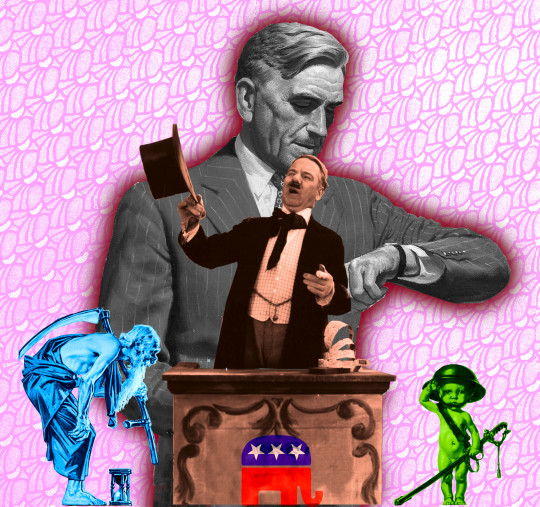
Today, Tor.com published my latest short story, "The Canadian Miracle," set in the world of my forthcoming (Nov 14) novel, The Lost Cause. I am serializing this one on my podcast! Here's part one.

The very instant the Social Security Act was passed in 1935, American conservatives (in both parties) began lobbying to destroy it. After all, a reserve army of forelock-tugging plebs and family retainers won't voluntarily assemble themselves – they need to be goaded into it by the threat of slowly starving to death in their dotage.
They're at it again (again). The oligarch-thinktank industrial complex has unleashed a torrent of scare stories about Social Security's imminent insolvency, rehearsing the same shopworn doom predictions that they've been repeating since the Nixonite billionaire cabinet member Peter G Peterson created a "foundation" to peddle his disinformation in 2008:
https://en.wikipedia.org/wiki/I.O.U.S.A.
Peterson's go-to tactic is convincing young people that all the Social Security money they're paying into the system will be gobbled up by already-wealthy old people, leaving nothing behind for them. Conservatives have been peddling this ditty since the 1930s, and they're still at it – in the pages of the New York Times, no less:
https://www.nytimes.com/2023/10/26/opinion/social-security-medicare-aging.html
The Times has become a veritable mouthpiece for this nonsense, publishing misleading and nonsensical charts and data to support the idea that millennials are losing a generational war to boomers, who will leave the cupboard bare:
https://www.nytimes.com/2023/10/27/opinion/aging-medicare-social-security.html
As Robert Kuttner writes for The American Prospect, this latest rhetorical assault on Social Security is timed to coincide with the ascension of the GOP House's new Speaker, Mike Johnson, who makes no secret of his intention to destroy Social Security:
https://prospect.org/economy/2023-10-31-debunking-latest-attack-social-security/
The GOP says it wants to destroy Social Security for two reasons: first, to promote "choice" by letting us provide for our own retirement by flushing even more of our savings into the rigged casino that is the stock market; and second, because America doesn't have enough dollars to feed and house the elderly.
But for the New York Times' audience, they've figured out how to launder this far-right nonsense through the language of social justice. Rather than condemning the impecunious olds for their moral failing to lay the correct bets in the stock market, Social Security's opponents paint the elderly as a gerontocratic elite, flush with cash that rightfully belongs to the young.
To support this conclusion, they throw around statistics about how house-rich the Boomers are, and how much consumption they can afford. But as Kuttner points out, the Boomers' real-estate wealth comes not from aggressive house-flipping, but from merely owning a place to live. America's housing bubble means that younger people can't afford this basic human necessity, but the answer to that isn't making old people homeless – it's providing a lot more housing, and banning housing speculation:
https://pluralistic.net/2021/06/06/the-rents-too-damned-high/
It's true that older people are doing a lot of consumption spending – but the bulk of that spending isn't on cruises to Alaska to see the melting glaciers, it's on health care. Old people aren't luxuriating in their joint replacements and coronary bypasses. Calling this "consumption" is deliberately misleading.
But as Kuttner points out, there's another, more important point to be made about inequality in America – the most significant wealth gap in America is between workers and owners, not young people and old people. The "average" Boomer's net worth factors in the wealth of Warren Buffett and Donald Trump. Older renters are more rent-burdened and precarious than younger renters, and most older Americans have little to no retirement savings:
https://www.forbes.com/sites/teresaghilarducci/2023/10/28/the-new-york-times-greedy-geezer-myth/
Less than one percent of Social Security benefits go to millionaires – that's because the one percent constitute one percent of the population. It's right there in the name. The one percent are politically and economically important, but that's because they are low in numbers. Giving Social Security benefits to everyone over 65 will not result in a significant outlay to the ultra-wealthy, because there aren't many ultra-wealthy people in America. The problem of inequality isn't the expanding pool of rich people, it's the explosion of wealth for a contracting pool of rich people.
If conservatives were serious about limiting the grip of these "undeserving" Social Security recipients on our economy and its politics, they'd advocate for interitance taxes (which effectively don't exist in America), not the abolition of Social Security. The problem of wealth in America is that it is establishing permanent dynasties which are incompatible with social mobility. In other words, we have created a new hereditary aristocracy – and its corollary, a new hereditary peasantry:
https://pluralistic.net/2021/06/19/dynastic-wealth/#caste
Hereditary aristocracies are poisonous for lots of reasons, but one of the most pressing problems they present is political destabilization. American belief in democracy, the rule of law, and a national identity is q function of Americans' perception of fairness. If you think that your kids can't ever have a better life than you, if you think that the cops will lock you up for a crime for which a rich person would escape justice, then why obey the law? Why vote? Why not cheat and steal? Why not burn it all down?
The wealthy put a lot of energy into distracting us from this question. Just lately, they've cooked up a gigantic panic over a nonexistent wave of retail theft:
https://www.techdirt.com/2023/10/31/the-retail-theft-surge-that-isnt-report-says-crime-is-being-exaggerated-to-cover-up-other-retail-issues/
Meanwhile, the very real, non-imaginary, accelerating, multi-billion-dollar plague of wage theft is conspicuously missing from the public discourse, despite a total that dwarfs all retail theft in America by an order of magnitude:
https://fair.org/home/wage-theft-is-built-into-the-business-models-of-many-industries/
America does have a property crime crisis, but it's a crisis of wage-theft, not shoplifting. Likewise, America does have a retirement crisis: it's a crisis of inequality, not intergenerational conflict.
Social Security has been under sustained assault since its inception, and that's in large part due to a massive blunder on the part of FDR. Roosevelt believed that people would be more protective of Social Security if they thought it was funded by their taxes: "we bought it, it's ours." But – as FDR well knew – that's not how government spending works.
The US government can't run out of US dollars. The US government doesn't get its dollars for spending from your taxes. The US government spends money into existence and taxes it out of existence:
https://pluralistic.net/2020/12/14/situation-normal/#mmt
A moment's thought will reveal that it has to be this way. The US government (and its fiscal agents, chartered banks) are the only source of dollars. How can the US tax dollars away from earners unless it has first spent those dollars into the economy?
The point of taxation isn't to fund programs, it's to reduce the private sector's spending power so that there are things for sale to the public sector. If we only spent money into the economy but didn't take any out of the economy, the private sector would have so many dollars to spend that any time the government tried to buy something, there'd be a bidding war that would result in massive price spikes.
When a government runs a "balanced budget," that means that it has taxed as much out of the economy as it put into the economy at the start of the year. When a government runs a "surplus," that means it's left less money in the economy at the end of the year than there was at the beginning of the year. This is fine if the economy has contracted overall, but if the economy stayed constant or grew, that means there are fewer dollars chasing more goods and services, which leads to deflation and all kinds of toxic outcomes, like borrowing more bank-created money, which makes the finance sector richer and the real economy poorer.
Of course, most governments run "deficits" – which is another way of saying that they leave more dollars in the economy at the end of the year than there was at the start of the year, or, put another way, a deficit probably means that your economy got bigger, so it needed more dollars.
None of this means that governments can spend without limit. But it does mean that governments can buy anything that's for sale in their own currency. There are a lot of goods for sale in US dollars, both goods that are produced domestically and goods from abroad (this is why it's such a big deal that most of the world's oil is priced in dollars).
Governments do have to worry about getting into bidding wars with the private sector. To do that, governments come up with ways of reducing the private sector's spending power. One way to do that is taxes – just taking money away from us at the end of the year and annihilating it. Another way is to ration goods – think of WWII, or the direct economic interventions during the covid lockdowns. A third way is to sell bonds, which is just a roundabout way of getting us to promise not to spend some of our dollars for a while, in return for a smaller number of dollars in interest payments:
https://pluralistic.net/2021/04/08/howard-dino/#payfors
FDR knew all of this, but he still told the American people that their taxes were funding Social Security, thinking that this would protect the program. This backfired terribly. Today, Democrats have embraced the myth that taxes fund spending and join with their Republican counterparts in insisting that all spending must be accompanied by either taxes or cuts (AKA "payfors").
These Democrats voluntarily put their own policymaking powers in chains, refusing to take any action on behalf of the American people unless they can sell a tax increase or a budget cut. They insist that we can't have nice things until we make billionaires poor – which is the same as saying that we can't have nice things, period.
There are damned good reasons to make billionaires poor. The legitimacy of the American system is incompatible with the perception that wealth and power are fixed by birth, and that the rich and powerful don't have to play by the rules.
The capture of America's institutions – legislatures, courts, regulators – by the rich and powerful is a ghastly situation, and to reverse it, we'll need all the help we can get. Every hour that Americans spend worrying about their how they'll pay their rent, their medical bills, or their student loans is an hour lost to the fight against oligarchy and corruption.
In other words, it's not true that we can't have nice things until we get rid of billionaires – rather, we can't get rid of billionaires until we have nice things.
This is the premise of my next novel, The Lost Cause, which comes out on November 14; it's set in a world where care and solidarity have unleashed millions of people on the project of maintaining the habitability of our planet amidst the polycrisis:
https://us.macmillan.com/books/9781250865939/the-lost-cause
It's a fundamentally hopeful book, and it's already won praise from Naomi Klein, Rebecca Solnit, Bill McKibben and Kim Stanley Robinson. I wrote it while thinking through and researching these issues. Conservatives want us to think that we can't do better than this, that – to quote Margaret Thatcher – "there is no alternative." Replacing that narrative is critical to the kinds of mass mobilizations that our very survival depends on.

If you'd like an essay-formatted version of this post to read or share, here's a link to it on pluralistic.net, my surveillance-free, ad-free, tracker-free blog:
https://pluralistic.net/2023/11/intergenerational-warfare/#five-pound-blocks-of-cheese

This Saturday (Nov 4), I'm keynoting the Hackaday Supercon in Pasadena, CA.
#pluralistic#class war#inheritance tax#death tax#mmt#modern monetary theory#intergenerational war#intergenerational wealth transfers#social security#ss
352 notes
·
View notes
Text



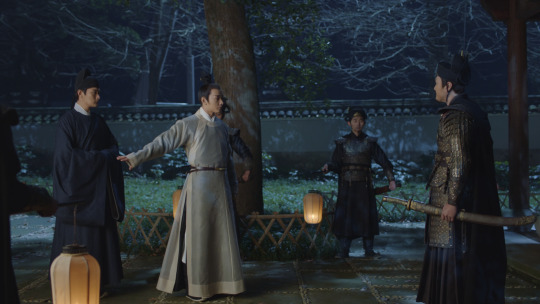

hlht ep 5 // byj ep 7
#byj may be a tragedy. but it is also their love story TO ME#I'M SO UNWELL ABOUT THEM#xcp has always looked at xdq when he's not looking#and by the end. not only did xdq look back but xcp is the one xdq is protecting this time ughuhH#xcp's feelings for xdq have been complicated since day 1 bc xdq has always been family to him#mixed in with inherited intergenerational trauma and the gulf between in their social class#otoh xcp to xdq went from a stranger to a friendly enemy to a confidante/aide and all that-#before even knowing he's family???? which for xdq is insane bc most of the ppl he protects are either family or ppl close to his family#by the time of their first farewell scene. their rs was summed up so perfectly as 即是兄弟也是友生#they're friends as much as they're brothers !!!!#and by the end of the story. it deepened into. he is him and he is also him. they're essentially the same people- AAAAA#LIANGYUAN I AM SHAKING YOU I'M SHAKING YOU VIOLENTLYyyyyYYY#鹤唳华亭#royal nirvana#hlht#my posts#ALSO LITERALLY NEVER OVER THE WAY XCP LOOKS AT XDQ WITH TEARY EYES WHEN HE WASN'T LOOKING
4 notes
·
View notes
Text
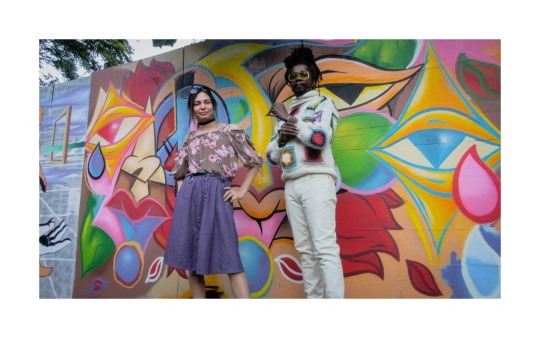
But Is It Vanity?
[This is my job right here, to get the children to think about the things they say and the assumptions they make. And to do it in a way that isn't humiliating, shameful or generally off-putting. I do think its the one quality as an Uncle, Titi, Titi or not-parent that I am very good at, if I do say so myself.]
M: You have a high opinion of yourself and your appearance. That is a big sign of vanity, especially your worth. Vanity refers to appearance, opinion and self worth. You have large amounts of pride in all of those. Dressing nice isn’t a sign of vanity, talking about it and showing it off is.
A person that dresses like you but doesn’t take photos or never brings it up would not be considered vain. Your extensive photos can count as showing off. It’s not a bad thing to be vain. You have a high opinion of yourself. Good for you, be confident!
T: Buenos tardes sobrino, you're analysis is very curious to me, because I'm un-partnered, all my parents are dead, and I don't have children of my own. So, who is necessarily supposed to document my existence, or the fact that I was even here? Now do I share photos with maybe less than six people, its probably like five, yes I do.
Let me tell you where I don't share photos anymore, not on Facebook, I shut that down. I've used Instagram stories to post my different looks in the past, but I'm not doing that anymore. I'm not really here to perform for folks or allow them to live vicariously through me. #LiveYourOwnLife
I dress nicely because I like to look nice, I could actually go without sharing the photos because I'm documenting myself primarily for myself, because at the end of the day I don't think anyone really cares.
If there's no documentation, did it really happen? Did I exist, did I leave a mark, did my life have value? Is thats self-absorbed, or vain, or full of myself, to want to be remembered or recalled, or is that human?
M: I don’t view you as self absorbed or anything nasty like that. You’re handsome and you’re happy with that, which I think is awesome. I’m sorry if I came off as rude, to myself the term vain isn’t something negative, as so I just viewed it as a trait like any other. The documentation of yourself is fair, at the end of the day I know very little of whom you communicate with or what so I could only comment on how it came off from my perspective.
T: Which is fair.
I used to broadcast wider, but that no longer felt authentic, many of those folks couldn't care less if I took another breath. And those who were vicariously living through my life were also leeches in my opinion, so I cut them off. Now I share with less than five folks, those rare moments when I actually leave the house.
I also share with my microblog, with its three followers, which will be my personal eulogy about my life in my own words after I am gone, well for as long as Tumblr is online which may be less than ten years, you never know.
I remember being jealous of this girlfriend who always had photographers around her documenting her life and accomplishments and I said to myself, I will be my own historian documenting my own life, because no one else is. No one may ultimately look or care, but maybe one image may survive beyond me, and maybe it will bring a smile to someone, or inspire them to become their own fashion icon.
I am a pariah in my life, the last one left behind with few still alive who are even concerned about my well-being. Documenting good moments is a way to say, hey I still matter, and I have something to offer even if no one is partaking. I find happiness in the unadulterated celebration of myself. #💌
M: That was really well written. Thank you for sharing that with me Titi❤️
Sometimes the young people forget that their elders have as much below the surface life as they do, we are full human beings with depth, doubts and concerns about our mortality. Approaching the challenge with love is all we can do in reminding them or teaching them who we are.
[Photo by Brown Estate]
#by example#conversation#lessons learned#teach the young#humanity#vanity#passing wisdom#fashion#personal style#self expression#intergenerational relationships#respect#journal entry#each one teach one#adulting#mortality#legacy#what do we leave behind#inheritance#how will we be remembered#existential questions
0 notes
Text
Book Review | It Didn't Start With You by Mark Wolynn
“It Didn’t Start With You: How Inherited Family Trauma Shapes Who We Are and How to End the Cycle” by Mark Wolynn is a powerful and insightful exploration of the impact of intergenerational trauma on individuals and families. The book offers a fresh perspective on how our ancestors’ experiences and traumas can shape our lives today, and provides practical tools for healing and breaking the cycle…

View On WordPress
#ancestors#ancestral healing#ancestral trauma#book reviews#breaking the cycle#epigenetics#family#family healing#family trauma#healing#health#inherited behaviors#inherited trauma#intergenerational healing#intergenerational trauma#it didn&039;t start with you#mark wolynn#psychology#relationships
0 notes
Note
beer killed my father . he had a disease which destroyed his body and strained his relationships with his wife, his friends, and his children. Alcohol destroys everything it touches, theres a reason you see so many liquor stores in poor neighborhoods. don’t be fucking obtuse. Prohibition obviously doesn’t work, but I wish alcohol was taxed higher. And i want the CEO of Heineken on the guillotine right after Jeff Bezos.
before anything, i want to let you know that i am incredibly sorry about your father. alcohol has decimated entire generations of my family, played a crucial role in the neglectful family structure i spent the first 19 years of my life suffering under, + played a minor but not insignificant role in my brother's death. i would never undermine or dismiss that in anyone.
i used to feel very similarly to you, in large part because my mother is a recovering alcoholic who raised me to believe that alcohol is a magic poison which turns people into monsters + i, being her child, probably inherited a disease which would also turn me into a monster if i chose to drink. it's a deeply painful + understandable response to the pain that alcohol can cause.
my first question is, does alcohol really "destroy everything it touches"? are there not millions of people who engage with alcohol, in varying degrees of recreational use, who experience minimal or no negative impacts? or do you believe that everyone who drinks alcohol in any capacity is experiencing severe destruction in their lives as a result? does the existence of people for whom alcohol enriches their lives (or is a neutral presence) at all invalidate your experience, or your father's?
my second question is, you've identified that there are 'so many liquor stores in poor neighborhoods' (i would add there is a lot of alcohol in rich neighborhoods, just distributed in less stigmatized ways, like boutique wineries + fancy bars), do you think that companies are strategically attempting to create alcohol dependencies among poor people, or do you think that poverty creates the pain, hopelessness, + desperation which can fuel an alcohol habit (which is then exacerbated by intergenerational trauma + community alcohol culture).
i feel no allegiance to liquor companies- they absolutely do make the bulk of their profits off of people who are drinking in a way that is destroying their lives (unsure if i trust the exact scope of the research in that link but i trust the gist). however, liquor companies love the disease model, because it exempts them from responsibility. if alcoholism is truly a genetic disease, then liquor companies, bars, package stores hold no fault in the development of destructive drinking habits + community norms (natasha Schüll discusses this in her book about gambling addiction)- the people were already sick + would be getting it somewhere else, anyway, right? but as you have correctly identified, liquor companies help create the structures which turn alcohol use into an accessible + normalized mode of self-destruction.
my third question is, will taxing liquor help the real problem? yes, it reduces alcohol consumption, but does it reduce addiction? or does it make cheapskates like me say "i'm not fucking paying for that" while individuals who consume alcohol compulsively either eat the cost or turn to more illicit ways of obtaining alcohol. or, rephrased, is the problem that alcohol is too accessible? is alcohol a magical poison which turns 'normal' people into 'alcoholics'? alternatively, is alcoholism a genetic condition, unrelated to any outside circumstances, which is triggered by drinking?
or: is alcoholism one of many ways in which people who are experiencing hopelessness, pain, grief, poverty, trauma, etc use to numb themselves, harm themselves, + make life feel more bearable? at this point, i do believe there is at least a temperament factor which makes people more likely to use substances over other forms of escape (hence why my brother used substances while i turned to anorexia + do not struggle with substance use). are we actually addressing the problem if we make it more expensive (thus, mind you, further impoverishing people with alcohol addictions!)? or are we shifting the pain these people are experiencing to either other avenues (opioids, other drugs, totally different ways of coping which are often just as destructive) or an unregulated, underground alcohol market.
the way you are viewing alcohol, alcohol is a unique substance which is manufacturing or feeding illness in people in order to make them behave in ways which destroy their lives + the lives of others. the way i am viewing it, alcohol is a presence which can fill a void that is being created in people's lives as a response to structural, communal, or social suffering. when alcohol is painted as the cause of this pain, we are able to look the other way from a which world is structured to cause an immense amount of people to suffer needlessly. at the same time, the common sense observation that many of us engage with alcohol in ways which do not destroy our lives, as well as the knowledge that prohibition does not work, prevents the erasure of alcohol from public or private life.
who benefits from the belief that alcohol is a uniquely corrupting substance? what lessons did we actually learn from prohibition- is trying to do it to a lesser degree (make alcohol less accessible) actually going to do anything? when the price of opioids went up due to dea crackdowns, did people stop buying opioids or did the market flood with cheap + deadly fentanyl? is the problem that people are drinking or that they are suffering?
1K notes
·
View notes
Text
Astro observations part 8
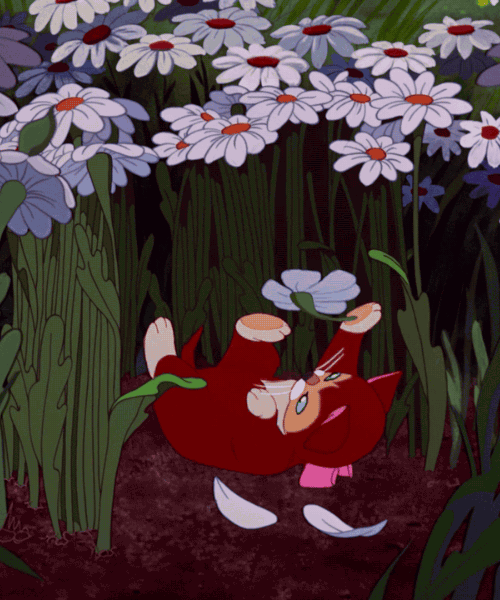
[LONG EDITION] - taken from my phone's notes (also, i was too lazy to edit it so here's a nice chunk of info)
🍂 Sun conjunct Saturn individuals inherit mindsets from the father, grandparents or great-grandparents. They might never fully act like their Sun sign (aka "shine"), since they've been conditioned from a young age to listen to parents, teachers, and later on bosses. They are the type to never divorce, no matter how toxic their marriage is. If these peeps deal well with their Saturn Return, they might become "THE BOSS" (aka the person everyone looks up to due to how accomplished, disciplined and rich they are, they've literally got their shit together and deserve a round of applause, "it wasn't easy to get to the top, but it was worth it" - you might hear them say this). They are also more prone to ingrain stoic principles in their lifestyle
🍂 Mars square Neptune gives off major cult leader vibes. They're the type to fool you with false promises until you sign up for their "camp" but then you realize it's actually an evil cult where all they wanna do is put you to work (and maybe later even kill you lol). These individuals become very scary when angry (you don't wanna see them angry, trust me). If they ever commit suicide, it'll be by drowning, alcohol or drugs
🍂 Mars trine Neptune is one of the best aspects for those who make a living off their talents. The talent depends on the element the trine is in:
If it's in Earth signs - ideal for those who work in the "money handling sector" in advertising, becoming an entrepeneur, holistic care (if Virgo is involved), cooks, those who work in interior design, seamstresses, embroidery/lace makers, models, event planners
If it's in Air signs - ideal for those who work in sales (their negotiation skills are ✨chef's kiss👌🏻✨), becoming a spiritual/religious teacher or an art/music/any other creative pursuit teacher (lmao, i can't even speak💀💀), writers, musicians, magicians and astrologers (for the last two - if Aquarius is involved)
If it's in Fire signs - ideal for dancers, theater/movie actors, hairstylists, circus performers, photographers (only if Leo is involved)
If it's in Water signs - ideal for make-up artists, painters, tarot readers
🍂 Moon sextile Uranus individuals have got the ability to create a positive parasocial relationship with their followers. Since these people often use their devices to validate their emotions, i wouldn't be surprised if most of y'all also have atleast one active profile where you post quite frequently
PRO TIP: Whenever Transit Jupiter is trining/conjuncting your Natal Uranus (to a less extent also the sextile), you'll get a sudden boost in your followers count
🍂 This is a theory of mine that i've come up with and i'd love to hear your thoughts on it. When it comes to intergenerational astrology, i do believe that we inherit all of our personal planets placements from our parents and ancestors. But then you might say "But i don't act like my mother at all! This is bullshit!". I'm not saying we're all carbon copies of our family members. What makes us unique and distinguishes us from our parents and grandparents (or even great-grandparents) are the way the planets aspect each other in our birth charts and the planetary configurations between them. Basically we start from the same ground, but we all use our traits differently, whether for the better or the worst expression of them. Let's not forget that we also tend to go through different life experiences than our parents and grandparents; we might be blessed with different opportunities that might enhance our best traits and help us achieve what our ancestors always wanted to but weren't able to
Hope you enjoyed today's post, loves!💗💗💗
I've been wanting to post for a while now but my inspiration has been wandering alone in the Sahara Desert
I can't promise that i'll start posting again more frequently (the new uni year is starting soon for me + i enrolled in a local astrology school 2 weeks ago🥳🥳 ya girl can't wait to officially become an astrologer) but my inbox will be open again for further questions!
I must also thank you for helping me hit 500 followers!!! I'm probably gonna do another ask game once i hit 600 followers, as i'm too busy right now.
As always, don't forget to drink water and take care of yourselves!
Hope to see you soon! ˚₊‧꒰ა ☆ ໒꒱ ‧₊˚
#astro#astro community#astro placements#astrology#astro observations#astro posts#astro notes#astrology notes#astro blog#astroblr#astrology community#astrology tumblr#sun conjunct saturn#mars square neptune#mars trine neptune#moon sextile uranus#intergenerational astrology
487 notes
·
View notes
Text
It's cool being part of the generation that watched the world we were promised be torched to the ground right as we were about to inherit it, and then watching literally nobody holding the flamethrowers even acknowledge that they burned it down at all. It's like witnessing intergenerational scorched earth policy, but all anybody can say for themselves is "oh well we didn't exactly have it easy either, you know how much salt we lost pouring it all over the ground as we went?"
506 notes
·
View notes
Note
genuinely curious, if you think "it's a girl!" and "it's a boy!" categorisations are inherently oppressive, do you believe a world where gender isn't recognized in any meaningful way before the child has means to define it for themself to be the best alternative?
I’m going to use a different abolitionist example to illustrate what I mean: when people advocate for abolishing the nuclear family, they are not saying “get rid of parental relationships” or “get rid of fathers.” They are identifying a specific social relation that is used as a building block of society and advocating for a world where it doesn’t exist, because its existence is the foundation of certain forms of oppression. The western social model where children are raised in private detached housing by a maximum of two parents (and realistically, mostly by their mother - a huge problem in itself!) who have complete control over their material, emotional, and social needs produces a fucking huge amount of adverse outcomes - abuse, trauma, dysfunction, poor health - the list is nearly infinite. And this family model also inherently reproduces class, race, and gender by virtue of the fact that children inherit those things from their parents and are forced to exist in those contexts. And even in individual cases where it doesn’t produce abuse, even if you have very good parents who are not abusive to you in any way, that social relationship is still oppressive, in the same way that having a cool boss doesn’t mean that wage labour is good. A society where children are not entirely dependent on one or two people for all of their needs, where they are free to form meaningful relationships with adults outside of strict categories of family, where children are not legally and socially treated like the property of their parents, where bloodline is not privileged as the dominant mode of intergenerational transfer of knowledge, culture, skill, wealth, etc, is a much better world!
“Gender abolition” is, I think, a poor term for a similar goal, and one that has a lot of reactionary baggage (baggage that is not coincidental - I think its imprecision as a term is useful for terf politics). Abolition of patriarchy is probably more precise - I am advocating for a world where gender is entirely non-coercive, where gender does not produce any oppressive social relations. You can engage in gender as a culture in the same way you can engage with different forms of art, in a way that is purely voluntary. This configuration does not prohibit the possibility of trans people; we would just exist in an entirely different form than the current western, medicalist, patriarchal, white supremacist context we are forced to navigate.
So yes, I think for gender to be truly emancipatory, it needs to be engaged with as a voluntary form of human culture, as a form of art that we do with ourselves and our bodies, and to do this we need to abolish sex distinctions on medical records, gender markers on state documents, gendered facilities, and many, many other things.
654 notes
·
View notes
Text
Today is Holocaust Remembrance Day. This whole week l have been thinking alot about the Holocaust. So last night I re-read maus. One panel really stuck out to me during this reading. For context this is in Maus 2 when Art is talking to his therapist, a Holocaust survivor, about how he feels he could never measure up to his father who survived Auschwitz. At this point in the story his father had already past. May his memory be a blessing.
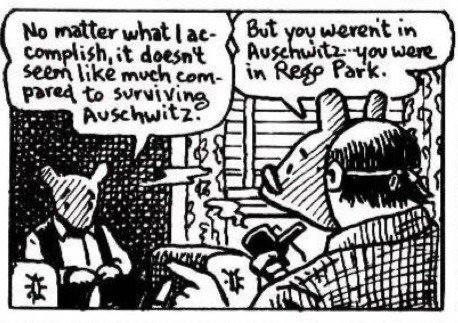
The dialogue, “but you weren’t in Auschwitz. You were in Rego Park,” hit me like a punch to the chest. I have no better way to explain the paradoxical guilt I felt and continue to feel as the granddaughter of a Holocaust survivor. I did not live during the Holocaust. It had ended before my grandmother reached eighteen years old. And yet, the Shoah seems to loom over me. Forever a reminder, that I am alive by sheer luck. My great grandfather’s parents as well as two of his brothers were murdered in Auschwitz. My great grandmother’s twin sister was also murdered in the Holocaust. Despite hours of research, I still have no idea where exactly she died.
Using the term guilty for what I feel doesn’t seem exactly right but there is no better word in the English language. Maybe if I was smarter or more articulate I could find better words.
A key theme of this chapter is intergenerational trauma. This is the same chapter that has this iconic image.
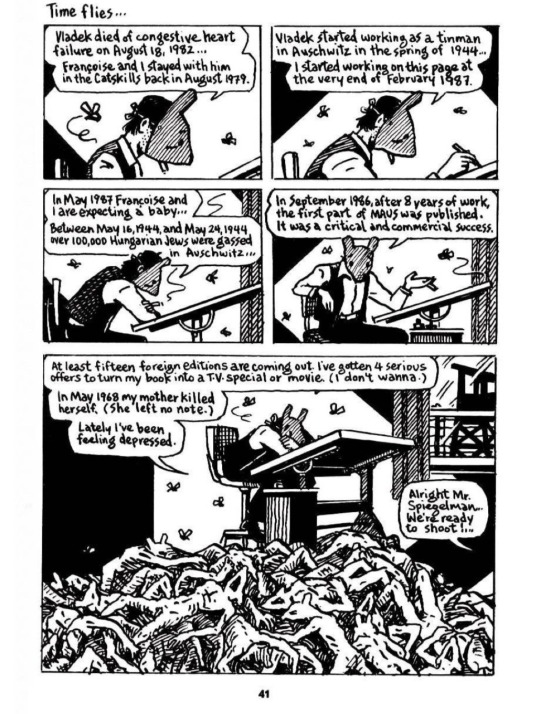
On this Holocaust Remembrance Day, I simply want to acknowledge the real and extremely painful intergenerational trauma and inherited survivors guilt felt by descendants of Jewish survivors. I know I struggled in the past with feeling like I even have any right to feel this way considering I am three generations removed from any of my family that were murdered in the Holocaust. If any other Jews struggle with thoughts like this, I want to assure you that your feelings are valid and real. Intergenerational trauma is complicated and the feelings that come with it don’t simply disappear once a certain number of generations from the event pass.
This post is specifically about the Holocaust and jewish intergenerational trauma stemming from our persecution and genocide. If this post resonates with you as a non-Jew who has intergenerational trauma I am glad, but please do not derail this post.
#history#holocaust remembrance day#holocaust#shoah#intergenerational trauma#jumblr#jewish history#shoah mention#tw shoah#holocaust mention#tw holocaust#judaism#maus#antisemitism#jewish trauma#survivors guilt#mental health
159 notes
·
View notes
Text
more of a half thought ! but its interesting how c3 handles the theme of repeating intergenerational cycles vs c1. like w c1 its v much history repeating itself, the same bands of heroes come together and fall apart in parallel ways. c3 i think so far has been kind of more about pc backgrounds and families?
like im thinking all the time about how swag is just a version of sol who didnt have friends, and otherwise their character arc (the way they seek connections/purpose and get exploited by them) is very purposely similar. then w the most recent ep, its callies mom as the descendant of aryox. the way her inherited gift causes her to fall down the same road as he did. cold and distant from the peoples shes fighting from, and dying in contrition.
.. if thats anything. theres also the ways duck team falls short of whats expected of them, and how that failure is what allows them to break out of those intergenerational familial cycles. (maybe callie especially? w like her inability to be stoic and her intensity of love is what allows her to reach out to the snakes and the wild)
maybe. or something . perhaps
97 notes
·
View notes
Text
Saltburn: The Reign of British Bourgeois (Meta)
I recently had an interesting conversation with a close friend of mine who said, "I don't think Saltburn is really about class." She said she thought it was mainly about obsession, in the most individualist and interpersonal way possible. I naturally disagreed, and we argued about it for an hour. But I think the reason she didn't think it was really about class was because the film had a categorically anti-Marxist conclusion. That is, a very British conclusion. In many ways, Saltburn is a Thatcherite's wet dream. Let's discuss.
Saltburn isn’t an “Eat The Rich” narrative. It’s an “Absorb The Rich” narrative. I disagree that Saltburn is merely about an individual’s obsession with a particular guy or family. Saltburn is about the bourgeoisie’s obsession with the old English aristocracy.
Let’s establish the establishment: the modern English aristocracy whose family seats litter the shires. Saltburn aims to satirize the English Country House family drama, and then some. This is made evident when Felix informs Ollie that, whoa, the Evelyn Waugh himself based Brideshead Revisited and other works on Saltburn, on Felix’s family. The film, in my opinion, was kinda ballsy to go there and to do it so bluntly. So yeah, Saltburn wants to poke fun at the long-established English tradition of aristocratic family dramas such as Downton Abbey, Brideshead Revisited, Bridgerton, Poldark, Rebecca, etc. It’s no coincidence that the movie begins with an egregiously stereotypical sketch of Ollie struggling to fit in at Oxford, à la Charles Ryder. Felix Catton is Sebastian Flyte, and then some. And Ollie is obsessed with him, because look at him. Except… I believe Ollie’s obsession with Felix is less of an interpersonal homoerotic deranged clusterfuck than it is the bourgeois boy’s perennial fixation with the unreachable closed-door English aristocracy, the national pinnacle of inherited class and status in a nation founded on inherited class and status.
Saltburn, butler and all, is a perfect symbol of English aristocratic privilege (seconded by none other than Oxford, but the film didn’t care to explore the hierarchies present in British education and instead chose to focus on family in lieu of academia). Saltburn is grand, medieval, kitchy, isolated in the middle of whereverthefuckshire. One would think that Ollie was intending to infiltrate Saltburn to possess Felix, but I rather think he was intending to infiltrate Felix in order to possess Saltburn. To possess Saltburn is to possess the rank and place of the Catton’s in the world, to be the world. And Ollie doesn’t want to destroy the Cattons nearly as much as he wants to embody them.
I suppose Ollie’s need to absorb, to consume, to possess and to incarnate is obvious through his actions—drinking Felix’s semen in the bathtub, the period blood bit, the grave-fucking debacle. He worms his way through every aspect of the family members’ lives with the intent to become them, to suck them dry (see: “I’m a vampire”, how gothic). By the end when the Cattons are all dead, Ollie celebrates the privilege he has grasped, and in turn, the film applauds his feat rather than condemns him. Saltburn is a film that congratulates Ollie’s usurping of wealth and privilege, rooting for him from beginning to end. And the film never tries to interrogate itself and ask why Ollie is our hero. Ollie, who does not want to break the wheel as much as he wants to be in the room where it happens, even if that means destroying everyone else in his path. Ollie’s obsession, generally speaking, arises from the desire for status and rank rather than an inoccuous maniacal insanity. This is symbolized by his possession and control of Saltburn. If Saltburn were a gothic ghost story, then Ollie is our specter. And Saltburn is definitely rooting for the specter, full stop.
Britain is a nation of ranks and hierarchies, naturally averse to watering down pristine intergenerational blue blood with filthy postmodern capitalist dollars. “Stay in your place”, that is the Tory way. Even in a “modern, democratic” nation nonetheless governed by an antiquated Tory hegemony and quite opposed to both radicalism and revolution. Ollie, however, wants to be in the room where it happens in a world where only those who are born in that room ever get to enter it. It is why he faces this overwhelming yearning for Felix’s world and Saltburn’s beauty – it is, by default, off-limits to him no matter how hard he tries to reach it. In my opinion, Ollie’s fascination with Saltburn isn’t due to a homoerotic fixation on Felix. It’s due to an outsider’s bourgeois fixation on the romantic world of inherited English rank, status, and wealth. The romance of Saltburn, our need to romanticize the privileged upper class, is evident in the stunning cinematography and costuming. Farleigh is the first person in the family to notice Ollie’s insecurities and see it for what it is – he’s begging to be let in. Farleigh likewise takes the opportunity to constantly, antagonistically remind Ollie that Saltburn isn’t his world, that he will never fit in and will never be accepted as one of them: the tux will never perfectly fit. It is the tragedy of the almost-theres. So Ollie decides to just get rid of everyone in his way and prance about naked since the tux refuses to bloody fit.
It’s just so English, culturally speaking. To claw your way to the top to sit with the big boys rather than to criticize the system that bred the arduous, back-breaking, fatal climb in the first place. This is Tory meritocracy, founded on decades of policies to reduce taxes on properties such as Saltburn in Britain, to keep old peers in the Lords. Felix Catton is Sebastian Flyte is Margaret Thatcher. Thatcher who, despite brandishing her “common” background as a selling point during her political career, painstakingly perfected the Received Pronunciation of her Eton parliamentary peers and successfully died with the coveted title of Baroness added to her name. Thatcher, an Oxford scholarship kid like Ollie, who wormed her way into a title and country house and was yet forever plagued by her average, middle-class upbringing.
Ollie is obsessed with much more than a mere man. If Saltburn were a Marxist class story, truly dedicated to class critcism or subverting the English Country House drama, Ollie would have burned the whole damn place down. But Saltburn is rather a Tory class story about the insane lengths the British bouregoisie, obsessed with ascending class hierarchies and disillusioned by the lies of meritocracy, will go to possess the near-unpossessable ranks at the peak of English-textured privilege. The film is a performance in English upper-class tomfoolery and a celebration of its infiltration by the almost-theres.
And yet, the cycle perpetuates itself. Saltburn is ruled by a new lord. Nothing, really, has changed.
#saltburn#saltburn 2023#barry keoghan#jacob elordi#rosamund pike#brideshead revisited#emerald fennell#films#movies#film analysis#movie review#2023 movies#english lit#english literature#oliver quick#felix catton#aristocracy#marxism#dark academia blog#dark academia#homoerotism#obsession#felix x oliver#film recommendations
144 notes
·
View notes
Note
hello !!
i was wondering, do you know any other characters like aang from other shows/movies/books? or maybe, just his theme of radical kindness appearing in other stories?
i've been missing aang, and it would be nice to find other representations of such a fun and warm personality like his.
ps.: your blog is like, fantastic. truly.
🥰🥰🥰🥰 This is the best ask I’ve ever received!!! Depictions of radical kindness in media is a special interest of mine—not exaggerating. So I’ve done my best to make a list of rec’s, just tv, from most formally similar to ATLA to least, with a short description for each.
1. Fruits Basket (2019)

"My mom told me, it's better to trust people than to doubt them. She said that people aren't born with kind hearts. When we're born, all we have are desires for food and material things. Selfish instincts, I guess. But she said that kindness is something that grows inside of each person's body, but it's up to us to nurture that kindness in our hearts. That's why kindness is different for every person."
An anime orphan whose established memory of the kindness by which her family raised her ends up transforming and liberating a whole clan from an intergenerational curse that enforced an abusive hierarchy all within a show that has a deeply queer subtext, beautifully complex plotting and character development that due to its zen influence refuses to demonize anyone or any perspective wholly, AND a straight romance you can actually root for!? Nothing comes closer to ATLA thematically than this show. While the lead Tohru Honda is the biggest representative of radical kindness, the character of Momiji Sohma with his complex purity, idealism, and gender performance is one of the closest you'll find to Aang in any media.
2. Mob Psycho 100 (2016-2023)

"The truth behind one's charm is kindness. Just be a good person, that's all."
Mob Psycho 100 explores a core tenant of ATLA's critique of imperialism and power: greatness and perfection are overrated. They both ask the question about what to do for the world with one's gifts if that's the case. How can one be both normal and prodigious at the same time? The satirical comedy and style of this anime, which deconstruct a lot of the shonen genre tropes, are pretty distinct from ATLA, but when ATLA arrived on the airwaves, it was a pretty massive break from tradition in Western animation, and for both of these series, that difference of style is tied to the message of the show about the experience and acceptance of difference.
3. Natsume's Book of Friends (2012-present)

"As I encountered kindness, I wanted to be kind myself."
The anime, Natsume's Book of Friends and ATLA both depict the challenge and necessity of facing abandonment, loss, and a deep-seated loneliness with kindness and gratitude despite the persistence of grief. Both take a deeply spiritual view--even a responsibility--of this experience that demands a compassion for all beings including those who intend to do harm. Natsume, an orphan shuffled between houses who is one of the few people who can see spirits called youkai, inherits his maligned grandmother's book of yokai names, becoming a target for them in the process. He hides all of this from everyone in his life, and even five season in, still has trouble admitting to the one person who understands him when he is struggling and needs help. The gentle and light tone papers over a profoundly honest representation of attachment trauma and the wisdom of compassion that develops as a tool to cope with it.
4. Hunter x Hunter (2011-2014)
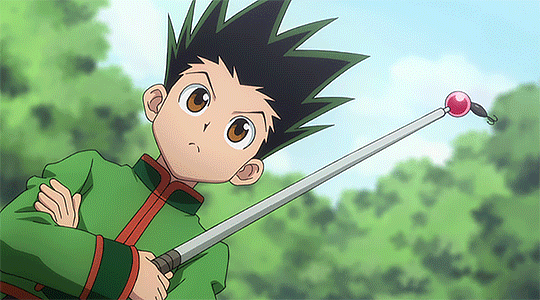
"You can do whatever you want to hide your feeling. You still have a heart."
If you think that "Radical Kindness" is by definition non-violent, then this show is either not for you or going to change your mind. Gon, the protagonist of HxH, like Momiji mentioned in Fruits Basket, is another rare character whose naivete and optimism are treated with respect. He is allowed to suffer, to be wrong, to be stupid, and to inspire others away from their own cynicism with the persistence of his beliefs nevertheless. But HxH is a show that integrates the most violent aspects of the world (organized crime, capitalistic competition and privileging, state-sanctioned brutality, pure sadism) with its examination of human potential for goodness. And even within a list of shows deeply inspired by spirituality and religions, this show is abundant with religious references as it seeks out meaning, balance, and an ethic for modern experience. On top of that, it ranks with ATLA for the depth and relevance of its magic system to its themes, plus its got gay subtext out the wazoo!
5. Mushishi (2005-2014)

“Make sure to remember, every person and place has a right to exist. It is true for you too, the entire world, as a whole, is your home."
Elegaic, episodic, compassionate, and strange, with some of the best short story-telling of all time, Mushishi is the story of a medicine-man who travels the Japanese countryside helping people deal with the spirits that accompany the little trials and tragedies of life that cling to our minds long after they're passed. The protagonist, Gingko, and the show itself takes the approach of restraint to observe these problems fully and come to a conclusion that's taoist in its balance and acceptance of reality--"Eyes unclouded by hate" as Miyazaki/Gaiman would have it. Each episode is like a therapy session arguing for you to choose to live even as the heaviest burdens sit on your chest.
6. Reservation Dogs (2021-2023)
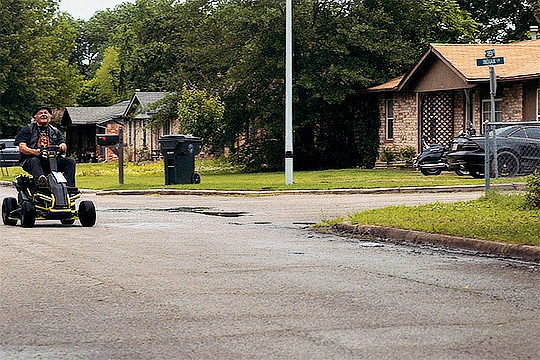
"See...love doesn't have to be received, it can just be."
We're finally out of the animes, and moving away from the zen and shinto approach into some other options. Reservation Dogs' indigenous humanism was groundbreaking, bringing in distinctly modern American realities (with the kind of true-to-life details only a an on-location shoot could offer) with Native beliefs about ancestry, community, and connection to the land, while rarely feeling preachy. Instead, it's just fucking hilarious and casually heartbreaking. Four friends on the edge of graduating high school on a reservation in Oklahoma try to figure out what to do with their lives after their plans to go to California get abruptly messed up. Radical kindness as a concept often gets focused on accepting the enemy but what about accepting the weird stoner uncle who farts all the time and won't talk about his years in the army. I think that might be a more important goal of radical kindness, in truth, if we are being asked to look and accept reality for what it is, because growing comfortable with disappointment and the mundane let's us live without the relentless striving that drives perfectionism.
7. Skam (2015-2017)
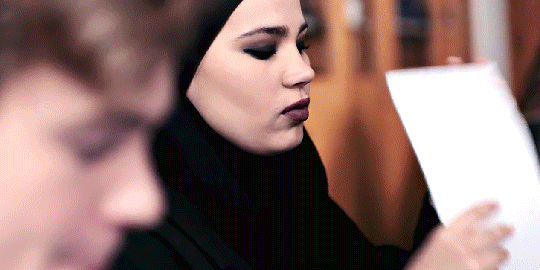
"The second you start looking for hate, you find it. And when you find hate, you start hating."
A Norwegian teen drama that understood internet culture better than any show before or since, four season-long romance plots better than any romance film from that decade, and a masterfully constructed exhortation about leaning into failures of connection to build deeper compassion rather than demonize another person or group. Each season focused on a specific character within a high-school friend group, emphasizing the limited scope of subjective experience, and had them confront the challenges of opening up to others fully. And even when they return into the scenes with new protagonists, their lives weren't sorted perfectly, reflecting how resolving a single romantic plot point would not resolve life. The impact of this low-budget public-television web series (!!!) will be felt for years (it's already been referenced by Netflix juggernauts like Sex Education and Young Royals), but we're not likely to see something that juggles political themes, heartfelt characterization, realistic dialogue, and meta-commentary (it flashed its own hater and fan comments across the screen in the last episode!!) in such a obsession-inducing package anytime soon.
7. Boys Like Boys (2023)
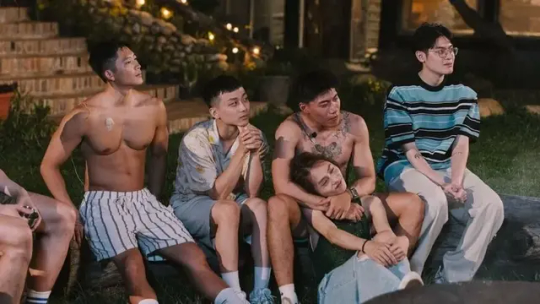
"Because I have always been someone who hates myself, I don't have the courage to face it. Running away is my only option...What if I give myself one more chance to be brave?"
So how can a reality show make it onto a list of radically kind tv series, especially a dating show!? Well, when that reality dating show casts people who radiate warmth, vulnerability, and respect and seem to have the kind of chemistry that most scripted shows can't even manage, it's a good start. But then, when they elevate that cast with a format that addresses the cruelty of dating, elimination formats, and broader societal exclusion (an important consideration for a gay dating show), it offers a new model for future shows. Boys Like Boys did this when mid-season (spoiler alert) they had contestants vote out a contestant, only to provide the contestants with a vote in which they could retain a contestant who they didn't want to leave. In fact, many of the contestants asked if they could abstain from making a vote that would eliminate a constestant and were allowed to. The final result left one contestant, Jia-Hang, up for elimination--he had voted for himself to be eliminated, and many contestants, recognizing his reticence to continue on the program, didn't want to force him against his will to stay. Then, looking around at nearly the whole cast sobbing, even apologizing to him for not providing him enough support, Jia-Hang chooses to stay on. This is just one of many heart-warming authentic moments in the show that illustrate the vital influence of kindness to impact the trajectory of our hearts.
8. Joe Pera Talks With You (2018-2021)
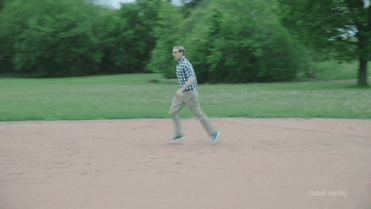
"I can help you reach things. I can tend the garden. The different hours we keep are a good thing. And when they overlap, I can offer companionship and entertainment."
So much has been written about this show's groundbreaking kind approach, I'm going to quote instead: "It can be difficult to convey how a TV show airing on Cartoon Network’s provocative nighttime programming block Adult Swim can evoke almost nostalgic feelings of kind-heartedness. The premise of Joe Pera Talks With You is so simple as to almost be beside the point: Comedian Joe Pera plays a lightly fictionalized version of himself as a sweet Michigander, a middle-school chorus teacher with small and specific passions. Joe likes breakfast food, obscure trivia, beans, trips to the grocery store, and his grandma. He greets every day with a contented smile, stands beneath a pale blue sky, packs a balanced lunch that contains no surprises. (A turkey sandwich with cheese and a tomato, a banana, some trail mix, and as a treat, some cookies.) Joe, more than anything, is satisfied. His greatest joy is sharing these small pleasures with you, the viewer who exists on the other side of the fourth wall he has cleanly dismantled, often speaking quietly to the camera like he’s sharing a secret, just between you two. That he’s talking “with” and not “to” you is a crucial distinction in the show’s title: Joe never lectures nor rhapsodizes. Instead, he waxes poetic about what he loves and who he cares for and how he leads his life, telling his stories from a vulnerable position of welcoming you into his daily existence.” --“A Great Comedy About Being Good,” Allegra Frank for Vox
9. Anne with an E (2017-2019)

"Her life was not short on challenges, and still she held no grudges, believing instead that grace is perennial like the green, green grass."
While maligned for not being the 1980s version, this Netflix adaptation of Anne of Green Gables takes what many have read as an autistic subtext and made it text, giving Anne a performative quality that pushes a lot of the audience into the same irritation that the characters of Avonlea feel for Anne at first, and, thus, requires its audience to persevere toward the same kindness that Anne inspires in her adoptive mother figure, Marilla, among others, which is much more rewarding than simply identifying with Anne right away. In so doing, it enhances the development of its broader approach to acceptance--an approach in its insistence on the requirement of a community of kindredness (see Sebastian's excitement at finding out about the black community in "The Bog") that is much more rigorous than many other shows will cop to. Expanding far beyond literal adaptation into queer, black, and indigenous characters, without disguising history or disparaging the thematic seed of grace at the heart of the novels, Anne with an E imagines what it meant and what it might still mean to build real joyful community with others through kindness.
10. Little Bear (1995-2003)

"Interesting."
A childhood favorite that disguised in its simplicity a wide-openness to the world and an acceptance of different natures. While most child shows emphasize kindness, few do so with as much patience, wonder, and generosity extended to its viewers. Little Bear is a curious kid who goes on adventures in the woods around his house that can turn into games or small imagined experiences. He is sometimes with his friends Cat, Duck, Hen, Owl, and Emily, whose personalities, along with Little Bear's, bring about small tensions in their games that ultimately resolve, if not independently, then with the help of Mother Bear or Father Bear, who give each other knowing glances about the expected childhood behaviors. This is the first show that initially taught me to observe things while withholding my judgment, that first step of radical kindness.
12. The Andy Griffith Show (1960-1968)
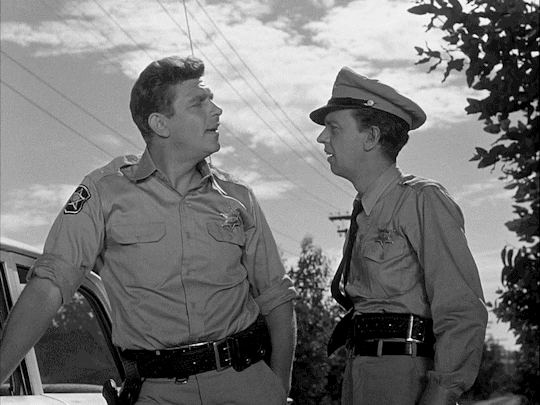
"The key to happiness is finding joy in the simple things."
One really old and somewhat controversial throwback for my last entry. If you have concerns about a sheriff character representing radical kindness, I would encourage you to start with the third episode of season 3 where Andy, the sheriff in question, has to explain to the new mayor why he doesn't carry a gun and lets prisoners go to gather their crops. There have been some fantastic pieces written about the complexities of this show's bucolic fantasy and Southerners (of all races) attachment to it, but they all acknowledge a type of humanistic and deceptively simple virtue found in Mayberry that audiences long to witness, if not emulate themselves. It's a morality that resists the "hyperactive zealotry" and bureaucracy that the show satirizes through Barney Fife (along with guest characters like the new mayor) and instead emphasizes the understanding that one can have for each individual and the trickstery middle paths that one can find to address conflict.
#sorry this took so long to respond to!#honorable mentions include Hey Arnold! & The Good Place & Friday Night Lights & S1 of Ted Lasso (but only S1 lol)#atla#kindness prevails#likealittleheartbreat recommends#fruits basket#mushishi#natsume yuujinchou#hxh#andy griffith#joe pera talks with you#reservation dogs#little bear#skam#awae#boys like boys#mp100
28 notes
·
View notes
Text
I think the thing I love most about Batman Beyond is old Bruce transitioning to being the guy in the chair. Like it’s so fun as a concept.
And it only works because Terry has no connection to the Batfamily whatsoever. Don’t nobody want that shit (the mantle of batman). That’s like giving someone intergenerational trauma as an inheritance. Like Why
#Batman beyond#terry mcginnis#Bruce Wayne#I’m ignoring epilogue for the specific purpose of cabining this to the series proper
34 notes
·
View notes
Note
Do you think Billy and Tommy suffer from intergenerational trauma ? Also we never see Billy and Tommy interact with Max. If you could alter their origins what would you do ?
(You don’t have to answer all these questions sorry lol)
When we talk about intergenerational trauma, we are usually referring to trauma which persists in our cultural memories, or to trauma responses which become cyclical patterns in our families. One of the things that's really interesting about this family of characters is that none of them were raised by their birth parents or grew up with a complete knowledge of/relationship to their cultural heritage. This is slightly less true now for Wanda and Pietro, post-retcon, but my point is that the way these people have inherited intergenerational trauma is typically non-linear.
I tend to get in trouble for saying this, but I think that Billy and Tommy's reincarnation makes the most sense as a metaphor for interracial adoption. Specifically, their relationship to Wanda, their Romani heritage, and their family history maps fairly well to that experience. So, while the course of their lives has been impacted by the trauma of past generations in a very material way-- and there is something to be said for epigenetics-- they may not have internalized the Maximoff family's intergenerational trauma in the way that you're picturing. The nature of their existence and upbringing creates its own traumas and fractured identities, but a lot of what they've inherited is going manifest in the course of processing new information about their background as young adults-- not to mention the ramifications of being publicly known as Wanda's children in a post-Decimation world.
I am not an adoptee, so this is not my experience to speak on, and you can take what I'm saying with a grain of salt, but I am a person of mixed Romani heritage, and family separation and cultural disruption in the wake of WWII are big parts of my inherited trauma. That's part of why I find the Maximoffs-- Billy and Tommy included-- so relatable, because that's a specific form of cultural trauma that they have had to endure in every generation, and in ways that reflect multiple periods of Romani history. Part of why I like to really emphasize the fact that Billy and Tommy are Romani characters is because their positionality and way of arriving at Roma identity adds nuance and diversity to Romani representation. I think the spectrum of Romani cultural & ethnic identity is something that a lot of comic writers and fans just don't understand, but I think that digging in to how Billy, Tommy, and Luna relate to those identities would be a really good, organic way to have those conversations in the text and bring a more authentic understanding of the subject to readers. But you absolutely need a Romani writer to do it, and that's why they need to start hiring us!!!!!
I'd also like to point something out that I don't think anybody really talks about-- the current version of Wanda and Pietro's origin story and how they got their powers reflects the real history of human experimentation, reproductive rights violations, and child abductions that have plagued Romani communities for a long time, especially in mid-century Europe. Their "mutations" are a product of that violence, and the fact that Billy and Tommy inherited those mutations reflects the medical and genetic legacies of this racial trauma. This is presented in direct contrast and conversation with the Maximoffs' magical heritage as witches, which is is a racial stereotype that here is subverted as a positive, enduring legacy of cultural empowerment and survival.
Of course, the text itself does not fully commit to these ideas on paper, but my point is that when you have the knowledge and you're invested in how Romani people are imagined and portrayed in this world, it's a very rich text!!! I love comics and I love these characters! There's so much to talk about!
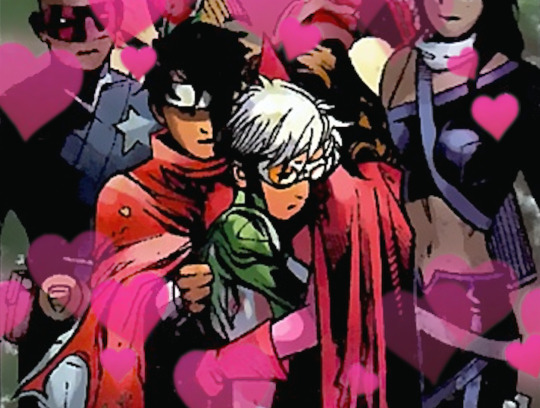
Since you did mention Magneto, I want to note that Wanda and Pietro's relationship to his & Magda's history and their inherited trauma is also non-linear, and has shifted several times based on retcons and varying character treatments. There's no doubt that they have a lot of baggage, but again, it's a situation where they didn't grow up as children of Holocaust survivors, so the way they process it might just be different. I certainly do think that the Holocaust and the war are part of their cultural memory, even if we don't know how much the Maximoffs were directly affected. Billy and Tommy are more removed from Magneto in this sense, but it should go without saying that one or both of them are Jewish and would already have a connection to that history through their foster/birth families.
21 notes
·
View notes
Text
Surviving Rock Bottom

🌼 For inner planets in 8th house natives; after crisis - before transformation = the stage of neuroses.
🌼 Before every transformation for 8th house natives, they are trapped by neuroses; they shed their skin after neuroses to reborn - this is almost constant in their life, but also happens at least one major rock bottom stage that they must learn to handle. Whatever may be the trigger, these natives face intense emotional crisis. Their life begins to get out of control - heart break, job loss, divorce etc. They fall into a downward spiral of ruminations, before they are consciously aware of it, they spend hours everyday thinking about the past with painful emotional outbursts. Ruminations are repetitive thoughts revisiting the same events from past. As we all know that 8th house placements are hallmark of intergenerational trauma, this crisis is the call for healing. This stage of life is called neuroses; it was also called hysteria in old days.
🌼 Carl Jung has said "in all chaos there is a cosmos, in all disorder a secret order, in all caprice a fixed law for everything that works is grounded on its opposite". The natives are yet to know the reason behind their suffering. Unfortunately, if they are lonely, it can take years for them in rock bottom, spending each passing day in the insanity. It is not so simple to get out of this obsessive rumination for the natives - otherwise they would do it already. They cannot just "choose to not think these thoughts" - this is what makes the rumination so powerful, this is what feels like fate, a doom, a curse.
🌼 The reason why these natives fall into this spiral is the heightened negative feelings. As we know that the 8th house signifies the territory everything that is hidden and unknown. This uncertainty of who they are (lack of sense of self) and where they are going (life path) compels them to seek certainty in life. 8th house placements are unfortunately not gifted with a "sense of self", they feel like invisible energy, like a jellyfish they feel transparent and attach themselves to people, things, interests, addictions and make it their whole personality. When in relationship, they mirror and depend on their "favourite person" for the validation of their existence. This relationship must break at some point in their life because they are also prone to invest themselves in wrong type of people, ignoring red flags and being irrational rather than logical about life choices.
🌼 Apart from astrological view, in the words of science, they are genetically predisposed to such neuroses states. In addition to this, their parents also create disturbing environmental influences for them to develop chronic emotional illnesses. These disorders are inherited - what we call "ancestral karma".
🌼 When the child never learned emotional regulation from their parents and also genetically prone to neuroses, they recall the negative material, negative "autobiographical memories" of the past and negative emotional state all the time. Gradually they fall into depressive states, ruminating about the events of childhood and fixating on negative emotions. If you are an 8th house native, you know exactly what it feels like - no words can describe what is only experienced by the fallen hero.
🌼 Some symptoms of this spiritual crisis are 1. Obsessive rumination 2. Compulsive behaviours as a routine 3. Depression 4. Apathy towards life (Nihilism and hopelessness) 5. Negative intrusive thoughts 5. Phobias 6. Perpetual anxiety state.
🌼 Lots of natives go to therapy and hospital in emergency to protect against suicidal ideation, self harm and self destructive addictions. Indeed in such cases, pills and medicines are necessary to rescue the natives from their crisis. However, Carl Jung writes that this crisis is the harbinger of soul transformation. He writes that anxiety is the attempt by psyche to self cure the trauma. He writes to 1. Experience the trauma rather than numb the symptoms with pills; 2. Identify the meaning of neuroses; 3. Understand what the neuroses is trying to tell/teach you; 4. Identify the purpose of neuroses in your life; 5. To go from infantile attitude to psychological development.
🌼 Unfortunately, I have seen natives with these placements never being able to cure their neuroses and instead fall into lifelong alcohol addiction problems that spoiled their family life and caused many miseries like road accident and early death. This shows how powerful and strong the anxiety is. If they belong to below middle class sections in society, they can even end up homeless and helpless (though 8th house is also connected with other people's money so they could be supported by spouse income or parental income).
🌼 There are some reasons why natives fail to get out of neuroses or delay it: 1. Laziness; 2. Lack the courage to face the challenge of life; 3. Lack of awareness or support system; 4. Fear of change. Though this is not a definite list. Never underestimate the power of neuroses; 8th house transformation doesn't always mean "something beautiful is born out of the mess". A lot of natives simply "transform for the worse" - they do not improve, they do not actualize, they just remain there in self destructive cycles. It is that scary. It is survivorship bias to assume that all 8th house planets will become spiritual and awakened - a lot of them do not and we never hear their story. So, if you are one of those who find themselves near self awakening, please grab the opportunity and get your life on track.
🌼 Therefore, it is crucial to understand that this neuroses is the urge to develop your own personality. It is a call to change your attitude towards life, to change your way of life, to not conform to the herd mentality, to focus your energy on living in the world rather than in your head, to attain psychological independence from your parents, to contribute to community as a responsible worker, to find a purpose in life. It is the call to do self actualization and attain self knowledge, although it is dressed like a nightmare with a hidden gift.
🌼 Do not waste anymore of your energy on internal conflicts, reliving the past memories and processing the trauma that happened to you. There is only one choice in life - to move forward or to regress to the immature and infantile mode again. Your are intuitive, you KNOW the answers in your heart. I always read about the "transformations" of 8th house natives but never really found an answer for what exactly transformation means? Is it magic? Or is it some legitimate process? I finally found the answer.
This video describes the concept:
youtube
Here is quotes from the video:
“What direction the patient’s life should take in the future is not ours to judge. We must not imagine that we know better than his own nature, or we would prove ourselves educators of the worst kind…It is better to renounce any attempt to give direction, and simply to try to throw into relief everything that the analysis brings to light, so that the patient can see it clearly and be able to draw suitable conclusions. Anything he has not acquired himself he will not believe in the long run, and what he takes over from authority merely keeps him infantile. He should rather be put in the position to take his own life in hand.”
- Carl Jung, Some Crucial Points in Psychoanalysis
“Only boldness can deliver from fear. And if the risk is not taken, the meaning of life is somehow violated, and the whole future is condemned to hopeless staleness.”
- Carl Jung, Symbols of Transformation
This transformation can take years and this is the rebirth of the Phoenix. Rising from the ashes into a new life. Starting from scratch. Shedding old skin. Burning bridges. Reborn. So many names.
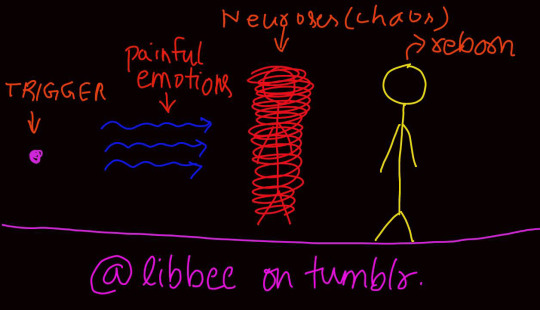
#astro community#astro notes#astro observations#astro placements#astro tumblr#astroblr#astrology#astrology blog#astrology notes#astrology observations#dark astrology#venus in 8th house#moon in 8th house#Mercury in 8th house#8th house#Carl jung#Occult#self development
258 notes
·
View notes
Text
Turtles Catches Up With Old GMMTV: The Bad Buddy Rewatch Edition, Part 3b -- More on BBS and Asian Cultural Touchpoints
[What’s going on here? After joining Tumblr and discovering Thai BLs through KinnPorsche in 2022, I began watching GMMTV’s new offerings -- and realized that I had a lot of history to catch up on, to appreciate the more recent works that I was delving into. From tropes to BL frameworks, what we’re watching now hails from somewhere, and I’m learning about Thai BL's history through what I’m calling the Old GMMTV Challenge (OGMMTVC). Starting with recommendations from @absolutebl on their post regarding how GMMTV is correcting for its mistakes with its shows today, I’ve made an expansive list to get me through a condensed history of essential/classic/significant Thai BLs produced by GMMTV and many other BL studios. My watchlist, pasted below, lists what I’ve watched and what’s upcoming, along with the reviews I’ve written so far. Today, I offer the second half of the third (ha!) of five posts on Bad Buddy. I'll look today at themes that myself and fellow Asian fans of Bad Buddy have caught and related to in this wonderful show.]
Here are links to part 1, part 2, and part 3a of the BBS OGMMTVC Meta Series. Today's post is a continuation of part 3a. Part 4 is here.
Yesterday, I began an unwinding about what I am calling the "Asian Cultural Touchpoints" of Bad Buddy -- the Asianness of Bad Buddy that is rooted and coded in the way people interact with each other.
As a quick recap from yesterday: I have been insanely lucky to engage in conversation with a number of legendary Asian BBS stans about the Asianness within Bad Buddy: huge shout-outs and thanks go to @grapejuicegay, @recentadultburnout, @telomeke, @neuroticbookworm, and @lurkingshan (who is not Asian, but has Asian relatives and is well-versed in the nuances of our cultures!). We captured a lengthy list of Asian cultural signposts in Bad Buddy and we've been having great discussion around them, including:
1) saving face,
2) intergenerational/inherited trauma,
3) the unique nature of secret-keeping in Asian cultures/societies,
4) enmeshed family boundaries,
5) setting up children to compete against each other for the sake of familial pride,
6) patriarchy, sexism, and the reversal of sexism among next generations,
7) the inset/assumed roles of family members based on patriarchy and elder respect,
8) assumed community within and external to one's family, usually based on where you live and where you go to school,
9) how one's identity is defined based on patriarchy and individualist vs. collectivist cultures,
10) how various cultures within an Asian nation live peacefully (or not) together (for example, what makes Pat and Pran different by way of Pat's Thai-Chinese heritage vs. Pran's ethnic Thai heritage),
and many more.
I unwound yesterday on the cultural touchpoints of saving face, intergenerational/inherited trauma (partly as a follow-up from my very first thesis on Bad Buddy), and the singular nature of secret-keeping in Asian cultures.
There's no way I can get through this entire list in two posts, but I do want to touch upon competition, enmeshed family (and friend, sometimes) boundaries, and patriarchy and sexism as three other cultural touchpoints that engendered quite a bit of conversation among our BBS mini-village.
Competition: ALL OVER BAD BUDDY. All over it, and we know it, and for the most part, we love Pran's and Pat's little love battles. Pat and Pran are constantly competing. Pat gets Chief Phupha into it in Our Skyy 2, dang it ("I'm Pha Pun Dao's top-notch," Phupha, psh). We don't know if the guys can function without having a competition going between them at any given point.
We know this structure started with their parents. As I talked about yesterday, considering the trauma that Ming and Dissaya faced in their young lives -- the trauma that they passed down to Pat and Pran, the rivalry and almost unbridled hatred that they expected Pat and Pran to embody -- all of that emanated through competition between the guys. Their parents asked them, daily, how the other kid was doing in school, making sure that their son was winning on top. As we know from Pat's rooftop monologue in episode 5, that was baggage he carried with him his entire life.
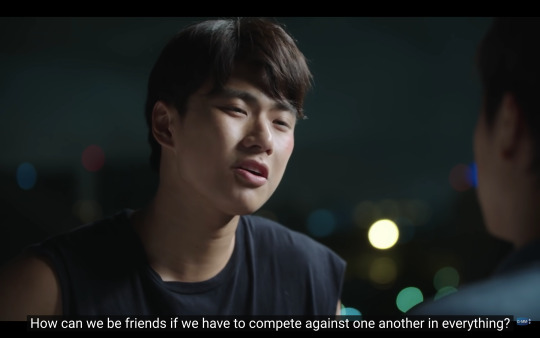

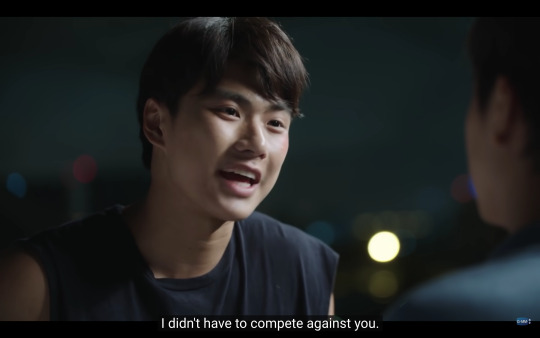

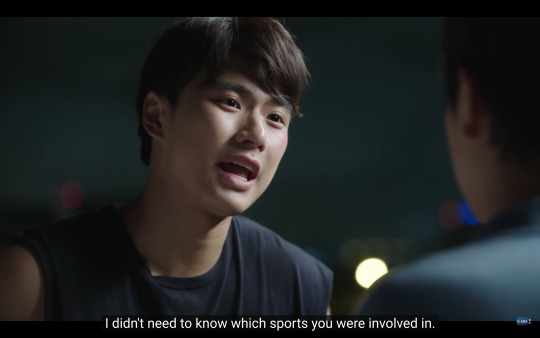
So many of these cultural touchpoints can be connected to the idea of saving face, as I wrote about yesterday. It is an overarching rule of any Asian child's life that Asian parents demand to be able to brag about their kids. Give me an Asian kid whose parents didn't do that to them, and I'll give that kid a huge hug, a gold medal, and a wish in an envelope that I could have had their childhood. Awards, top grades, top class positions, top university admissions: the need to be the best is neverending, for the sake of a parent not losing face for their child not succeeded at the top level of everything.
@telomeke notes the inherent cultural demands of Pran's and Pat's family in the competition paradigm that Pat outlines above.
[Re: Ming and Dissaya]: [E]very time [the children] do well, the bar often gets pushed a little higher. We actually see Ming doing this to Pat in Ep.1 ... when Pat tells him he was made class president. Ming says something like "get yourself a gold medal for rugby and then I'll let you brag"; Pat's achievement (though not dismissed) is downplayed rather than celebrated, and another goal is set. Anyway, my read is that both the boys had caliber to start with; it's natural to Pran (we don't see Dissaya really pushing him to excel), and I think he pushes himself to excel, to be the virtuous paragon of everything, as a barrier to the outside world, and to protect his vulnerable, secret interior. ... And Pat was pushed by Ming to match Pran's achievements, though not for the usual Asian parent reasons – it was to continue his own efforts to best Dissaya, IMO...
What @telomeke outlines here correlates perfectly with my own experiences of my Asian childhood: that even in the face of successes that my parents demanded, the reward was only a passive comment that I had to be doing more. There was never a moment where a parent's cup of happiness was truly filled from the child's perspective.
However, in the case of Pran and Pat specifically: @grapejuicegay had a further illumination that highlighted the utter pain and sadness of the outcomes and consequences of their lifelong competition. We know they were perfectly paired as a couple in love. But ultimately? Because of the pressures they faced as children vis à vis each other -- they also become the only people who could compete with each other. AND, because of that reality -- a new kind of empathy sprung up between them, what I called in part 1 of this series a radical empathy of a kind we don't always see between enemies to lovers. @grapejuicegay's thoughts:
I'm just thinking about the first family interactions we see for Pat and Pran and how Dissaya is framed as a concerned parent with her main worry being Pran taking on too much on his plate with being the head of the department. But also how that's so far removed from what her influence had made of him - an overachiever to the highest degree. ...[T]he whole point of Pat and Pran is that they're evenly matched in everything (which works so well because they're both such EXTRA little shits with so many lil' interests), and it's been there since the [original] trailer. They both keep competing to see who can get the most achievements to brag about, eventually settling down to a point where they help each other out because they're each other's only worthy competition because they're the only ones who can keep up with each other [emphasis mine].
So.... Dissaya's concern is nice and all, but she created this monster who not only can handle having so many responsibilities, but ENJOYS it. And Pat's help is always pushing him to do all of it, just have some help along the way so he's not doing it all alone. Wai helps, but he has to be manipulated into it. So the only person ACTIVELY helping Pran even when neither of them thinks he needs it is Pat ("I know you can do it, but I want to do it for you").
I was tremendously moved when @grapejuicegay shared her read with me on this, because not only did it land fully with me -- but it served to highlight the sadness and loneliness that existed in the gulf between Pran and Pat prior to their union. In other words, because they knew, so well, HOW to compete with each other -- if they needed help, they were the only ones who knew HOW to help each other. Pat showing up at the dilapidated bus station; Pran showing up at the empty auditorium. They could vibe when each other needed a little push. They knew WHEN and HOW to help each other, with the fluency they had ABOUT each other, even before their relationship began -- because they had been competing all their lives. As Pat said in Our Skyy 2: "we've been neighbors all our lives." They knew each other's ins and outs better than even their families did.
The competition that Pran and Pat engaged in had significant cultural roots. But the long-term impact of that competition? It rendered the guys on their own lonely island, a place where only the two of them could understand each other fully. It's a romantic conclusion -- to know your partner so well like that, it can fill your heart with nostalgic reckoning. But as Pat said above and to his father -- it was a bruising path, for the both of the guys.
There's a lot to enmeshed boundaries in Bad Buddy. The boundaries that SHOULD exist between two people that regularly get crossed. I definitely want to acknowledge, before I unwind on these boundaries, that Western vs. Asian viewers will have different expectations of exactly what enmeshment looks like and what it means. I'll have more on this in a bit.
When I think of enmeshed boundaries in Bad Buddy, I think of Dissaya having almost total control over Pran's physical placement. Of Ming knocking on Pat's dorm door, unannounced. Of Pat's expectation that Pa would do his laundry (which will speak to the sexism I'll talk about in a bit). @neuroticbookworm noted how hilariously Asian it was that Pat and Pa -- older brother and younger sister -- literally shared a dorm room. Pat could scuttle to Pran's solo room, to their love nest, to leave their shared room alone for Pa and Ink. But: what an Asian set-up, to have big bro sleeping on the floor, while little sister got the bed.
But besides what Western viewers might traditionally think of as "unhealthy" enmeshed boundaries, there's also a conversation about how Asian families engage -- or, don't engage -- with expectations of privacy. The biggest and most obvious example of a violation of personal privacy in BBS is that Pran's and Pat's parents forbid their children from having friendship with the kid next door. We know, in the end, that the parents cannot control that behavior of their kids, and yet, the parents try to do so anyway, with traumatic results.
@telomeke talked in our mini-village about the everyday functionality of Asian families crossing borders of assumed privacy. These are crossings that I fully relate to: for instance, I wasn't allowed to lock my bedroom door very often when I was growing up, to allow for complete access to my "private space," even and especially while I was in it.
I remember this as a thing growing up, that it's perfectly fine in [Asian countries] to drop in unannounced when it's family (though I think with widespread cellphone availability, people do check in beforehand now – however it could also be just to make sure there's someone in to receive them when they drop by!). It's a bit of a truism that the more traditional Asian parents will be in every part of your life and may not always know how to give you more distance when you grow older. ... For the more traditionally-minded, I think this phenomenon would be even more pronounced. And we definitely see this with Pat and Pa too.
The stories I heard about parents busting in on their Asian kids in compromising positions because the kids HAD to leave the doors unlocked? Stories about full-grown adults being interrupted in their intimacy because their parents came into the house? Countless stories. Us as Asians -- we might laugh about it, but there's also an unspoken and inherent sense of annoyance, of fear, of "how do I explain this now?" that's like a dull, permanent foreboding.
In thinking about how these boundary-crossings were inherited vis à vis Pat and Pran, into the next generation, of course -- all we have to think about are the many, many times we saw Pat crossing into Pran's threshold at Tinidee. That shot of Pat wrapped in his comforter as he shuffles to Pran's door.
However, @grapejuicegay flagged for me an utterly legendary Bad Buddy meta post written by @transpat now nearly two years ago, describing the Indian concept of haq, a concept I know very dearly well. To quote @transpat on the definition of haq:
in context of relationships, we use it to describe the entitlement ppl we keep close are allowed over us. in our culture, with every bond we form and built, we owe those ppl certain rights over us. like our filial duty to our parents, supporting our siblings and relatives emotionally and/or financially, the loyalty to our friends. lovers and spouses are ppl given all the rights of a family member by choice and obv other stuff like touching u in ways others can't, sharing worries and secrets you wouldn't indulge others w, the permission to carry and lighten ur burdens.
We know so well that Pat didn't just cross the hallway of Tinidee; he climbed through and over windows, over roofs, to get to Pran. And Pran... let him in. We know now what Pran's feelings were all that time, at least from 10th grade to university. Of course, Pran would let Pat in, because he had already let Pat into his heart. Maybe not into his psychological safety zone -- that had to take much longer. But in a much more primal sense, Pran had let Pat in, for so many reasons beautifully illustrated by @transpat in their piece, and for the examples up above, especially by way of the inadvertent closeness they achieved through their never-ending competing with each other.
I want to take a quick moment to highlight the two concepts I bolded above in @transpat's description of haq. I don't know if I have the words to describe this as well as @transpat, but to the point of entitlement and having rights over someone... there's a certain sense in Asian group dynamics, that one's business is everyone's business, if that makes sense. Think about cliques when you were growing up. Those cliques were formed on similar desires and interests -- being rich, beautiful, "cool," etc.
I feel like Asian group dynamics go a bit beyond this. Because you are in a group, it must go that any one single person's business is everyone's business. There is an entitlement to information about other people. In the States, we value individualism, and when these cliques are being formed in our youthful years, there's certainly a clash with people wanting to express themselves as individuals; very often, the group dynamics do not allow for individual expression. I would argue that that's even more strong in Asian circles.
If I could describe what I think was happening when Pat was climbing into Pran's window to, say, make that first deal about getting Wai to apologize -- I do very much believe that Pat felt it was his intimate right to go into Pran's room, as it had been established that they were, once more, schoolmates and neighbors, now that Pran was back in his family home. If Pran filled those roles -- schoolmate, neighbor -- it automatically clicked into Pat's social expectations that Pran was there to be talked to and engaged with, no matter if Pran would try to push him out. We know that Pran would give up on pushing Pat out, because Pran had feelings for Pat. BUT: what I love about @transpat's INCREDIBLE meditation is that Pat also clicked into unspoken social roles that allowed him to seek out a moment of friendly intimacy with Pran. (Besides the fact that it's more theorized now that Pat had unknown attraction for Pran during high school -- but I don't think attraction was what brought Pat into Pran's room to discuss that very first deal.)
I think this meditation on enmeshed boundaries, as I mentioned earlier, feeds nicely into the final points I want to make about the last cultural touchpoint for analysis, that of patriarchy and sexism in Asian families.
The BBS mini-village sliced and diced the incredibly overarching examples of patriarchy in this story, as emanating mostly from Ming: Ming's role as the head of the family and doling out roles; Ming ensuring that Pat would "not forget" Ming's reputation at university; Ming's parents doing nothing to interfere with Pa's role as serving Pat; Pat reinforcing that role to Pa in the family home.
Why Ming? As @telomeke broke it down for us: Ming is the head of the household of a Thai-Chinese family. It's not to say that patriarchy and sexism don't exist in ethnic Thai families -- but a patriarchal dynamic isn't shown in Pran's house, as Dissaya is the one who holds the emotional control over the Siridechawats. It's in the Jindapat household that we see old-fashioned roles of men and women doled out.
In traditional Chinese society (before the Communists came to power in China), sons had absolute pride of place in Chinese families, and we see Ming giving special treatment to Pat, while Pa was made to clean up after Mr. Jindapat Jr, doing his laundry, having the piece of chicken she wanted stolen by him in Ep.1, etc... Ming invited Pat home for a meal in Ep. 7, but didn't mention Pa, and Pat had to say he'd bring her along. But Pat and Pa, away from home didn't care for any of this, (e.g., when they were kids Pat let Pa win the bicycle race and skip washing up duties, in the Ep.1 flashback), and while Pa would begrudgingly do Pat's laundry, she would give as good as she got as well whenever they tussled (verbally).
As @telomeke says above, we see Pat, within his generation, to Pa, in their own private space of bicycling outside or moving into his own dorm room, quietly dismantling that patriarchy and sexism of Ming's and Pat's mom -- letting Pa win the bicycle race; talking out of earshot of their parents about Pat protecting, instead of hurting, Pran. [Another great example, a little outside of the patriarchal example but still worth noting, is Wai's role, as a stand-in for Dissaya, sticking to the definitions of the role of Pran's best friend, but showing -- within the cohort of his own generation -- that he CAN change to accept Pat in Pran's life, as opposed to Dissaya's inability to do so (scroll down through the whole liveblog post for the commentary!).]
@telomeke mentioned in our conversation about patriarchy and sexism that he was surprised that he'd see a parent as young as Ming -- a parent to a student of Pat's age, much younger than myself and @telomeke -- keep up with these traditional, old-fashioned values. I think that's a great point, especially in the way that Ming ignores Pa only until the end of the series, when he's instead cut Pat mostly out of his caring reach for disobeying him. We know from the Soonvijarn analysis and reaction videos by Aof Noppharnach and his collegial community of filmmakers, that Aof took inspiration for Ming stealing the scholarship from Dissaya from a real-life occurrence of the same story. I think Aof intentionally had such strong patriarchal structures in Bad Buddy vis à vis the Jindapats in order to highlight what a stronghold old-fashioned notions of life have on generations -- and intended to have a conversation vis à vis Pat, Pran, Pa, and Wai, that the ways in which these old-fashioned notions are updated over time, is through the work of the subsequent generations of children growing up and learning and knowing better.
The coded Asianness of Bad Buddy... god. I could sit with my fellow Asians and talk about the coded Asianness of Bad Buddy for at least weeks, if not maybe even a year or two. We could laugh about the comedy of many of the experiences or traumas we have faced vis à vis the cultural touchpoints that I've listed and analyzed, and we could also share our shared pain, our shared joys, our shared ways in which we express emotion, love, our highs and lows, through our shared Asian cultures. Talking about this makes me tremendously glad that there's national and international fandoms watching Asian shows -- even if, say, Western viewers can't exactly pinpoint what's happening by way of a culturally contextual moment in Bad Buddy, at least there's a community of Asian bloggers out here that can unwind what might be confusing.
Once more, I want to thank @recentadultburnout, @grapejuicegay, @telomeke, @neuroticbookworm, and @lurkingshan for engaging me in such amazing and extensive conversation about the best show ever Bad Buddy. More than education -- the process was INCREDIBLY fun and rewarding.
(Tagging @dribs-and-drabbles, @solitaryandwandering, and @wen-kexing-apologist by request! If you'd like to be tagged in this series, please let me know!)
[WHEW! SEVENTH INNING STRETCH, FRIENDS, stand up and stretch yer arms as I crack my knuckles one more time for this fabulous show! My last post for the BBS OGMMTVC Series -- a breakdown of my theorized reasons and timing regarding Pran leaving for Singapore -- drops next week. Stay tuned!
And after this, I take the tiniest break from the OGMMTVC to review one of the most important shows of 2023: La Pluie. And then I'm back on my tip with Secret Crush On You and an end-of-the-year rewatch of KinnPorsche. So, much more to come!
Here's the status of the Old GMMTV Challenge watchlist. Tumblr's web editor loves to jack with this list, so please head to this link for the very latest updates!
1) The Love of Siam (2007) (movie) (review here)
2) My Bromance (2014) (movie) (review here)
3) Love Sick and Love Sick 2 (2014 and 2015) (review here)
4) Gay OK Bangkok Season 1 (2016) (a non-BL queer series directed by Jojo Tichakorn and written by Aof Noppharnach) (review here)
5) Make It Right (2016) (review here)
6) SOTUS (2016-2017) (review here)
7) Gay OK Bangkok Season 2 (2017) (a non-BL queer series directed by Jojo Tichakorn and written by Aof Noppharnach) (review here)
8) Make It Right 2 (2017) (review here)
9) Together With Me (2017) (review here)
10) SOTUS S/Our Skyy x SOTUS (2017-2018) (review here)
11) Love By Chance (2018) (review here)
12) Kiss Me Again: PeteKao cuts (2018) (no review)
13) He’s Coming To Me (2019) (review here)
14) Dark Blue Kiss (2019) and Our Skyy x Kiss Me Again (2018) (review here)
15) TharnType (2019-2020) (review here)
16) Senior Secret Love: Puppy Honey (OffGun BL cuts) (2016 and 2017) (no review)
17) Theory of Love (2019) (review here)
18) 3 Will Be Free (2019) (a non-BL and an important harbinger of things to come in 2019 and beyond re: Jojo Tichakorn pushing queer content in non-BLs) (review here)
19) Dew the Movie (2019) (review here)
20) Until We Meet Again (2019-2020) (review here) (and notes on my UWMA rewatch here)
21) 2gether (2020) and Still 2gether (2020) (review here)
22) I Told Sunset About You (2020) (review here)
23) YYY (2020, out of chronological order) (review here)
24) Manner of Death (2020-2021) (not a true BL, but a MaxTul queer/gay romance set within a genre-based show that likely influenced Not Me and KinnPorsche) (review here)
25) A Tale of Thousand Stars (2021) (review here)
26) A Tale of Thousand Stars (2021) OGMMTVC Fastest Rewatch Known To Humankind For The Sake Of Rewatching Our Skyy 2 x BBS x ATOTS (re-review here)
27) Lovely Writer (2021) (review here)
28) Last Twilight in Phuket (2021) (the mini-special before IPYTM) (review here)
29) I Promised You the Moon (2021) (review here)
30) Not Me (2021-2022) (review here)
31) Bad Buddy (2021-2022) (thesis here)
32) 55:15 Never Too Late (2021-2022) (not a BL, but a GMMTV drama that features a macro BL storyline about shipper culture and the BL industry) (review here)
33) Bad Buddy (2021-2022) and Our Skyy 2 x BBS x ATOTS (2023) OGMMTVC Rewatch (The BBS OGMMTVC Meta Series is ongoing: preamble here, part 1 here, part 2 here, more reviews to come)
34) Secret Crush On You (2022) (on pause for La Pluie)
35) KinnPorsche (2022) (tag here)
36) KinnPorsche (2022) OGMMTVC Fastest Rewatch Known To Humankind For the Sake of Re-Analyzing the KP Cultural Zeitgeist
37) The Eclipse (2022) (tag here)
38) GAP (2022-2023) (Thailand’s first GL)
39) My School President (2022-2023) and Our Skyy 2 x My School President (2023)
40) Moonlight Chicken (2023) (tag here)
41) Bed Friend (2023) (tag here)
42) Be My Favorite (2023) (tag here)
43) Wedding Plan (2023)
44) Only Friends (2023) (tag here)]
#bad buddy#bad buddy meta#bad buddy the series#bad buddy the series meta#backaof noppharnach#aof noppharnach#ohmnanon#ohm pawat#nanon korapat#patpran#pran x pat#pat x pran#the bbs ogmmtvc meta series#turtles catches up with old gmmtv#the old gmmtv challenge#ogmmtvc#turtles catches up with thai BLs#turtles catches up with the essential BLs#asian themes in bad buddy#patriarchy and sexism in bad buddy#enmeshed boundaries in asian culture#enmeshed boundaries in bad buddy#competition in bad buddy#competition in asian culture#asian cultural touchpoints in bad buddy
49 notes
·
View notes